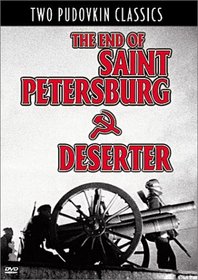| Actors: Vera Baranovskaya, Aleksandr Chistyakov, Ivan Chuvelyov, Aleksei Davor, Vladimir Fogel Director: Vsevolod Pudovkin Genres: Action & Adventure, Indie & Art House, Classics, Drama Sub-Genres: Action & Adventure, Indie & Art House, Silent Films, Drama Studio: Image Entertainment Format: DVD - Black and White,Full Screen DVD Release Date: 10/15/2002 Original Release Date: 10/12/1934 Theatrical Release Date: 10/12/1934 Release Year: 2002 Run Time: 3hr 13min Screens: Black and White,Full Screen Number of Discs: 1 SwapaDVD Credits: 1 Total Copies: 0 Members Wishing: 1 MPAA Rating: Unrated Subtitles: English |
Search - The End of Saint Petersburg / Deserter on DVD
  | The End of Saint Petersburg / Deserter Actors: Vera Baranovskaya, Aleksandr Chistyakov, Ivan Chuvelyov, Aleksei Davor, Vladimir Fogel Director: Vsevolod Pudovkin Genres: Action & Adventure, Indie & Art House, Classics, Drama UR 2002 3hr 13min A giant of early Soviet revolutionary cinema, Vsevolod Pudovkin overwhelmed the film world with his masterpieces based in montage, the creation of a psychological whole from short pieces of thematically-related film. Inten... more » |
Larger Image |
Movie DetailsSimilar Movies
|
Movie ReviewsFine double-feature Tryavna | North Carolina | 10/29/2005 (4 out of 5 stars) "For most people, classic Soviet cinema basically begins and ends with Eisenstein. Of course, the Soviet/Russian film tradition is a particularly rich one, so there's far more to it than Potemkin and Alexander Nevsky. If you haven't encountered the movies of Dovzhenko, Kalatozov, Vertov, and Tarkovsky, then you've got some wonderful discoveries in store. As much as I love the work of all of those directors, including Eisenstein, I've got to say that Pudovkin, who made these two films, is my favorite Soviet filmmaker. Arguably, he's also become the most influential because his approach to editing (bricking montage, in which each successive image is built upon the one immediately preceding it) has won out. That is to say, his theory and practice of editing have proven themselves to be the most successful in terms of telling a story cinematically. Watching these two movies, you're going to understand where the genius of later masters like Peckinpah, Scorsese, Tarantino, and the Coen brothers originated (historically speaking). If you think of yourself as a student of cinema, then your education simply isn't going to be complete until you view some of Pudovkin's films.
The two films in question are quite different from one another. The End of St. Petersburg was the second of Pudovkin's three silent masterpieces -- Mother (1926) and Storm over Asia (1928) being the other two. This film, like Eisenstein's October, was commissioned to commemorate the 10th anniversary of the 1917 Revolution, which swept the czar from power and led to the establishment of the USSR. Consequently, the story is pure propoganda, criticizing the decadence of the bourgeois industrialists and celebrating the brotherhood (and sisterhood) of the workers. A peasant boy moves to St. Petersburg to obtain work but becomes the tool of greedy factory owners until he sees the error of his ways and joins his fellow workers in their revolution. If you can't see beyond the propoganda, then you're probably not going to enjoy this film; however, if you can take the propoganda with a grain of salt, then you're going to see Pudovkin near the height of his powers, creating certain montage sequences that are breathtaking and as fresh today as the work of any living director. The second film, Deserter, was Pudovkin's first sound film and illustrates his attempts to create a montage of sounds to work alongside his montage of images. While it's interesting, insofar as it depicts the international workers' struggle from the point of view of Germans, it's simply not up to the same high standards of Pudovkin's silent work. He seems to have been one of those directors (like King Vidor and Rex Ingram) who continued to make a few interesting films during the sound era but whose real genius lay in the use of film as a truly international artform, which the sophisticated techniques of late silent film directors very nearly achieved just before the coming of sound in the late 1920s and early 1930s. The DVD, which was released by David Shepard's Film Preservation Associates through Image Entertainment, is very good -- though I'm a little skeptical of putting 193 minutes of film on one single-sided DVD. Ideally, this should have been a two-disc set with a couple of good extras. (Unfortunately, Pudovkin has slipped into obscurity in recent years, and none of the currently in-print DVDs of his work include so much as a commentary track.) Still, the prints are good and the music score for End of St. Petersburg is decent, even though it dates back to 1969 itself. (If you don't care for it, then you might try playing a CD of Prokofiev's music, which surprisingly seems to fit just about any silent Soviet film.) The sound for Deserter is not terribly impressive, but I'm not sure how much to expect out of a soundtrack from a 1933 Soviet film, so I certainly won't hold Shepard responsible for that. I believe that the print for End of St. Petersburg is the same as the one that Kino uses on their DVD, but for some reason, the image on this DVD looks a little better. So if you're trying to decide which one to get, I'd recommend that you get this one, and pick up Image's 2004 release of Bed and Sofa, which also contains Pudovkin's short comedy Chess Fever. (Unfortunately, Dovzhenko's Earth, which comes on Kino's release of End of St. Petersburg is in extremely bad condition and needs some serious restoration.)" |






